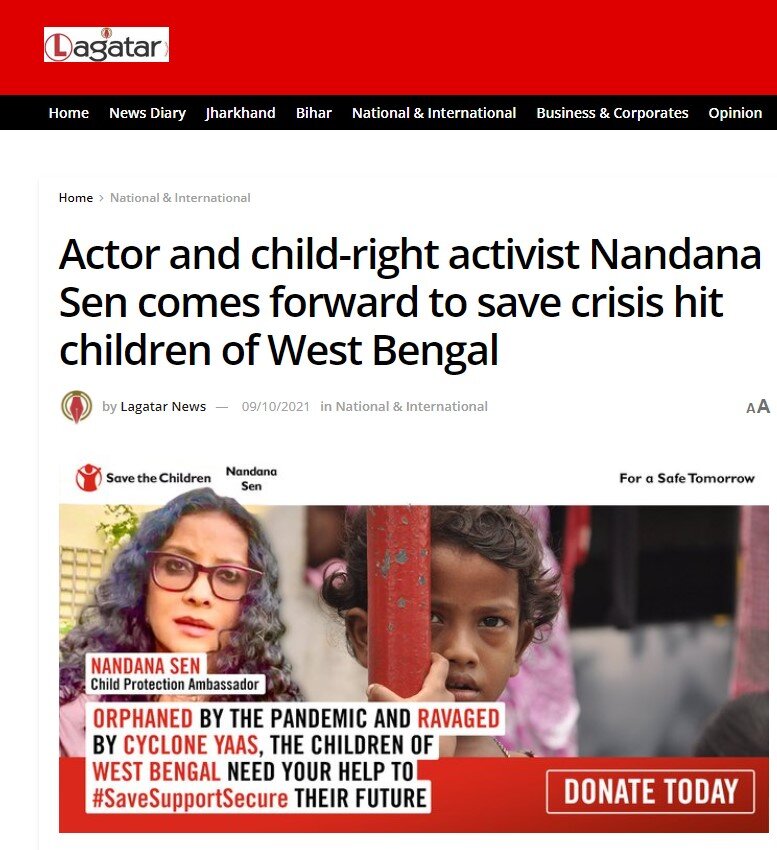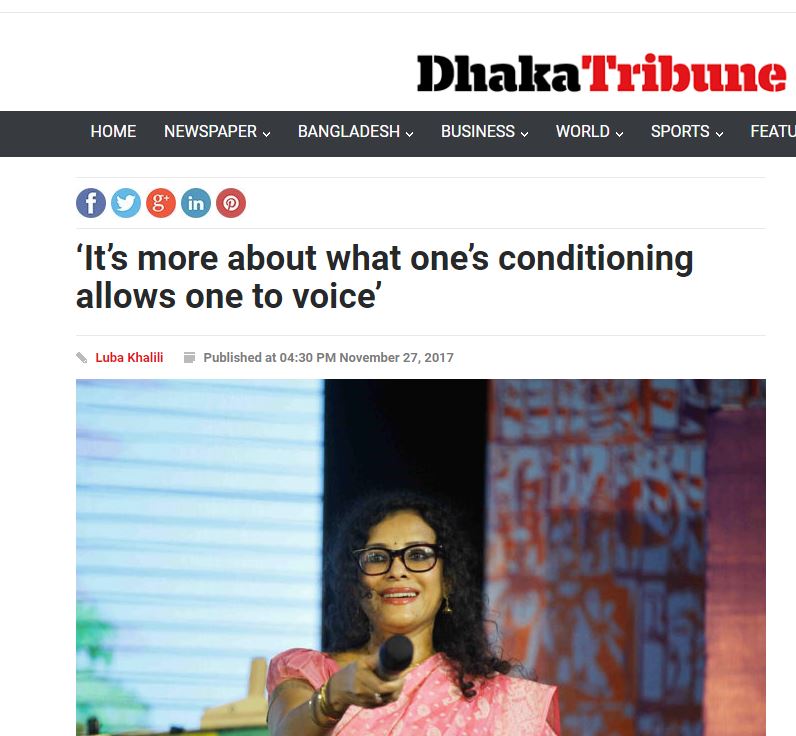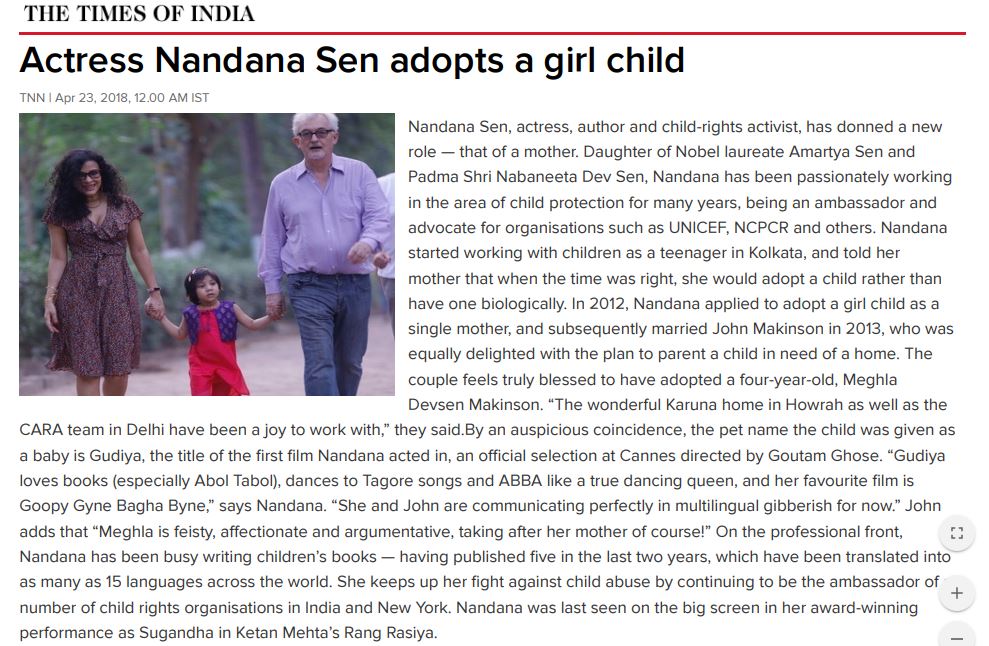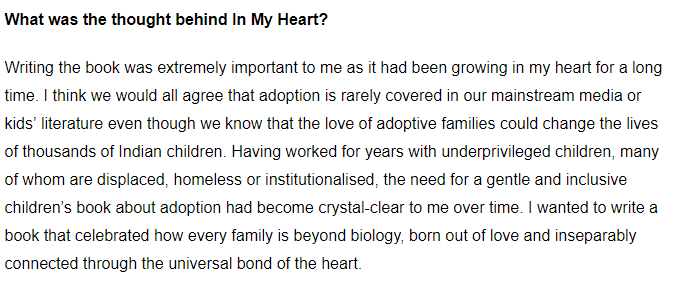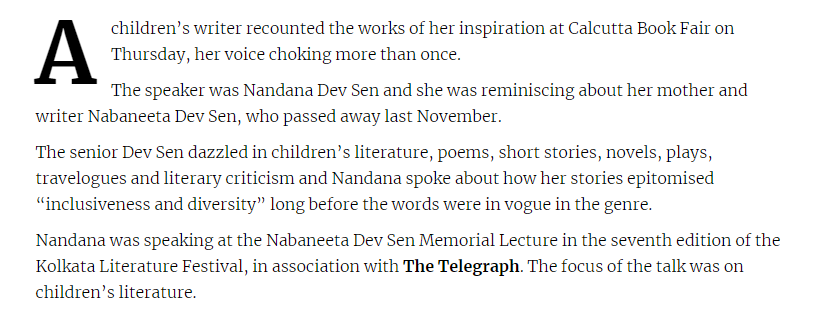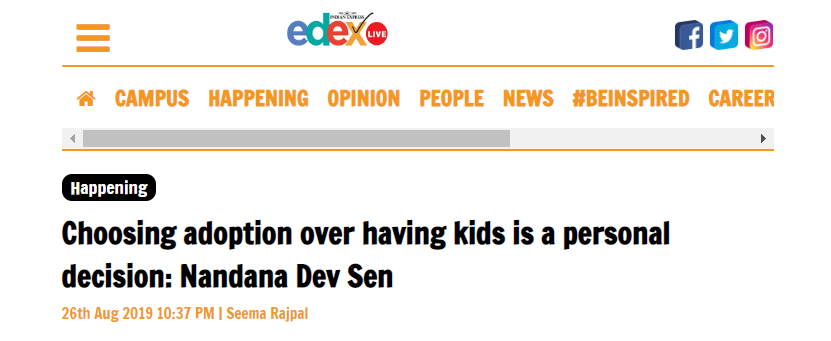Child Rights
Along with writing books and acting in films and theater, Nandana Dev Sen promotes the cause of child protection: for over 25 years, she has worked closely with children from troubled backgrounds. Nandana is the Ambassador for Child Protection for Save the Children, India. She has worked closely with children and grown-ups at UNICEF, RAHI (India's first organization for survivors of child sexual abuse), Apne Aap (ends sex-trafficking by providing education and preventing intergenerational prostitution), and the global childrens’ NGO Operation Smile, as an Ambassador and advocate for child protection. She collaborates with the National Commission for Protection of Child Rights (NCPCR) as a Child Rights Expert and Juror for Public Hearings, and has been actively fighting to stop the crisis of child trafficking in India, with organizations such as Apne Aap, NCPCR, Sanlaap, FXB International, and Terre des Hommes foundation. Nandana is also an Ambassador for Apne Aap, which provides legal support and access to welfare, as well as income generating progams to at-risk and prostituted women and children. Nandana is also a Champion for End Violence, a partnership launched in New York by UNICEF which has an ambitious, comprehensive and evidence-based approach towards stopping violence against children across the world.
In 2019, Nandana was awarded the Last Girl Champion Award by Apne Aap for her work against human trafficking and child abuse, and her tireless fight to empower marginalized girl children.
Here’s a video showcasing her work in this area.
Nandana has been invited to speak on the cause of child protection in various international conferences, including the Global Call to Action Summit for Child Survival and Development organized by USAID; the International Comprehensive Cleft Care Conference; an expert panel in the Jaipur Literature Festival on on Nutrition and the Girl Child; as well as in top current-affairs shows such as We the People.
Whenever possible, Nandana combines her commitment to child rights with her acting and writing work, especially her campaign to end violence against women and children. She originated the role of the traumatized protagonist, a survivor of child sexual abuse, in the immensely successful play 30 Days in September in India's leading repertory Prithvi Theatre, as well as in the film Chuppee/ The Silence, sponsored by UNIFEM (now UNWOMEN). Nandana was first seen nationally across Indian screens in the iconic film Black, which explores the rights of disabled children and was voted one of the 10 Best Films of 2005 by TIME magazine (and earned Nandana a nomination for Breakthrough Performance of the Year). As an actor, she has consistently chosen films that make a strong statement against violence, such as The War Within (against religious war), Tango Charlie(against ethnic violence), and The World Unseen (against apartheid). Nandana's performance in Rang Rasiya (Forbidden Colours), a political period drama on religious intolerance, won Nandana the Kalakar Award for Best Actress in 2015.
Mambi and the Forest Fire, Nandana's first children's book, grew directly out of a workshop she conducted in Kolkata in a home for children rescued from trafficking.
With Rahnuma (name changed) and Inspector Papiya of The Anti Human Trafficking Squad, Kolkata, India.
Nandana also writes Youthquake, a monthly fiction series focusing on the rights of children and youth, published in The Wire, The Telegraph, and Youth Ki Awaaz. Written as narratives from a young person's point of view, these stories are inspired by contemporary reality, and explore topics such as domestic violence, teen pregnancy, sexual abuse, and LGBT rights. The idea behind each story is to make its readers, parents as well as children, think about the rights and freedom of the Indian youth.
Recent Broadcasts
and Press
Millenium Post - click here for full article (external site)
July 18, 2022
APN News - click here for full article (external site)
July 18, 2022
The CSR Journal - click here for full article (external site)
July 18, 2022
The Telegraph Online
October 9th, 2021 - click here for the full article (external website)
The News Files
October 9, 2021 - click here for the full article (external website)
Anandabazar Patrika - click here for full article (external website)
October, 2021
Lagatar
October 9, 2021 - click here for the full article (external website)
Save the Children India website - click here for full article (external link)
March 8, 2021
Nandana recorded a message to focus on #AccessForStreetChildren, part of Save the Children India’s commemoration of the International Day for Street Children, focusing on the pandemic and its impact
On India’s Children’s Day, Nandana joined Humanity 2.0 for an In Conversation Webinar - video below
November 14, 2020
To highlight Save the Children’s Girls’ Safety campaign, Nandana made this appeal to the young people of India.
October 27, 2020
To mark the International Day of the Girl, Nandana made an delivered a very special message including a reading of her mother’s iconic poem, Ei Kaal Chirokaal, translated by Nandana. #DayOfTheGirl
October 11, 2020
Nandana Sen, the winner of Apne Aap's Last Girl Champion Award for 2019, concluded the Last Girl Awards evening with a word of thanks, and a message for all. Watch the video below.
October 11, 2020
Nandana read a bedtime story as part of the global campaign #GlassesinClasses for visually impaired children on World Sight Day
Watch the reading here: #GlassesinClasses Bedtime Stories and the news feature can be found at Bloomberg.com
October 8, 2020
In her role as Save the Children’s Ambassador for Child Protection, Nandana spoke out against child labor, rallying for a zero tolerance policy on Radio City 91.1FM.
Link to listen below.
October 5, 2020
NRBNEWS24.com Celebrity Talk Show - click here to watch the full show
October 3, 2020
Click here to watch the video via Facebook
July 30, 2020
Darkness, in Full Colour : A story about adolescence and sexual violence
March 2, 2018
Outside the Window, the Beat Within : About the festive pulse of a city, and unspoken celebrations of the heart
October 18, 2017
Daughtering Beauty: That Sparkle We Get From Our Mothers :
May 14, 2017
Darkness, in Full Colour : A story about adolescence and sexual violence
March 13, 2017
Happy New Year: A Short Story about Childhood Trauma
May 2, 2017
Can You Dance With Joy? On the brother-sister bond - and how to be open about love
October 2, 2016
* * *
Op Eds, Columns, and Interviews
on Child Rights
Interview: Mirrors Window Doors
Op Ed: A Terrible Tolerance: Outlook India
Op Ed: Democracy's Dirty Word: Is politics over taking India's inherent humanism?:Telegraph India
Op Ed: Gender sensitivity is a mattter of life and death...all of us are accountable: Indian Express
Guest Editor: Kangaroo Kisses and Hippo Headaches: Critical Blast
As “Mambi And The Forest Fire” hits the stands, actor-activist-writer Nandana Dev Sen says authors can find emotionally safe ways of making kids more aware of the world they live in.
Serious about pursuing her love for writing, actor and activist Nandana Dev Sen has come up with her second children’s book. Published by Puffin it is about a shy little monkey, Mambi, who is full of imagination, energy, curiosity, fears, trepidation besides being capable of courageous feats. The adventures of this spunky monkey evolve into a journey of self-discovery.
Edited excerpts from an interview:
What inspired you to write children’s books?
My mother and grandmother who wrote extensively for children and adults had a great influence on me and growing up in the midst of this enormous collection of kids’ books must have something to do with it as well! Drawn to freedom, fantasy and fun that children’s literature is suffused with, I wrote my first novel, most precociously, when I was ten years old. My mother still has that manuscript!
Writing for children grew naturally out of having worked with kids for years, in child protection. Children, no matter their history, bring such wonder into your life, and make you re-think so much that you take for granted. So many stories built up in me over the years, that I knew I had to consciously make the time to start writing them down. I’m also blessed with seven wonderful nephews and nieces (to whom Mambi is dedicated), who are a constant source of inspiration. I wrote my first book ‘Kangaroo Kisses’ for my oldest niece Hiya who never wants to go to bed!
How did “Mambi And The Forest Fire” come into being?
Mambi came into my life in a room full of amazing children in a shelter near Kolkata. Wanting to encourage the kids to express themselves creatively we found that as most had a traumatic past they were initially shy. Struggling to break the ice, I found myself conjuring up Mambi on the spot, the shy little monkey who wants to be like her older, ‘cooler’ jungle friends but is more heroic than anyone else. At the end I was playing with a delightfully raucous, utterly irrepressible bunch of kids. It was the most incredible transformation I’ve ever seen in one day and one of the loveliest days in my life.
What are your thoughts about child abuse in India?
It is very important to stop denying, neglecting, or condoning it. We must truly prioritise protecting all the children of India and for this we need to stop passing the buck and start holding ourselves accountable. A paradigm shift is required to view every child as our own and make child protection every citizen’s responsibility. Yes, it is a start to make good laws, and we have passed some excellent one, like POCSO, but there is still such limited awareness of it. We must do more to let children and adults know what their rights are – and make sure the laws are implemented in an urgent and time bound manner. We must all realise that nothing in the world is more important than protecting every child’s right to have a childhood.
Your views on the role of art initiating discourse on social issues…
It has a very important role not only in starting a discourse but also in healing. In fact, after Prithvi Theatre opened ‘30 Days In September’, based on ground-breaking research on child sexual abuse by RAHI, a girl from the audience embraced me in tears saying watching me was like looking at her own self in the mirror. That was the first time she had ever spoken about her repeated abuse by her uncle, and soon after, this brave girl confronted him too. It was one of my most rewarding experiences as an actor. The play spread awareness and inspired many to break their silence and prompted a viewer to start an NGO.
Plays, films and books have the ability to change the way we look at the world, and in doing so, they can go a long way in changing the world. Children’s literature has the unique capacity to use fantasy to sensitise children to a larger reality, a reality to which privileged children may not always be connected. I don’t equate the world of fantasy here with an idealized, idyllic world. I see it as a world of imagination full of characters that a child can relate to, a world that can make a child more aware of topics, even difficult ones which they face on growing up.That’s why the first Mambi book focuses on finding the courage to help others in need, and discovering your own unique voice while celebrating diversity. I don’t believe in sheltering children from the harder truths. As authors we can find inventive and emotionally safe ways of making kids more aware of the world they live in.
Will the audience get to see you soon on the screen again?
I hope so! I’ve read many scripts in the last year since the release of Rang Rasiya but as an actor I’ve always had a rather eccentric taste in films and I must admit this has just got worse lately! At this point, I’m keen to work only in films that I’m so passionate about that I’d happily take a break from all my writing commitments – the four children’s books and two adult books I’ve promised to write, and a screenplay I’ve completed recently that has gained a lot of traction. So, as an actor, I’m choosing between two such promising projects, one in India and one in the UK.
Interview: Nandana Dev Sen: My work in child protection has been integral to my life: Times of India
Guest Post: Nandana Dev Sen: Mrs. Mommy Booknerd’s Book Review
Article: Sensitivity: The Telegraph Calcutta
Gender sensitivity is a matter of life & death
And all of us are accountable, says Nandana Sen, combining activism and acting
What were your key points of address at the recent Call to Action Summit for Child Survival in Chennai?
A systemic gender bias directly endangers girl children in India. Right from birth (indeed, even before), boys get far better care than girls, who, if they survive, can face other crises. For example: child marriage, illiteracy, violence based on caste and religion, sexual abuse, child trafficking. In the last 10 years, the ratio of girls to boys under six has fallen alarmingly due to female foeticide. Gender-based violence is disturbingly on the rise; the majority of our youth believe husbands are justified in beating wives.
This dangerous bias is reinforced by our laws and practices — marital-rape impunity or the two-finger test and our popular culture through TV shows that romanticise child marriage or exonerate child traffickers; films that objectify women and glorify heroes who stalk them. It is reflected in the tolerance for gender-based violence in all strata — affluent families who condone sexual abuse, khap panchayats that justify honour killings, leaders who publicly blame a gang-rape and murder victim, functionaries who mishandle and don’t report child abuse.
Prioritising a gender focus is imperative for promoting equity in all areas of child development, be it in healthcare or education, the judiciary or the police. Be it in ensuring greater male participation in our community outreach, or integrating into our medical tracking systems a critical focus on protecting the girl child. We cannot afford to assume that gender sensitivity is not a matter of life and death, for we know that it is; or, that the problem is so immense that we can’t make a difference. We can, and we must. All of us are accountable.
What triggered your interest in this and when?
I’ve always found it deeply disturbing that our instinct often is to distance ourselves from the child on the street, the child working hazardously, the child who has been raped, the child who has been sold. As if she belongs to an alien universe. I can’t remember a time when I wasn’t working with children, whether with street kids in Calcutta, when I was no more than a child myself, victims of domestic abuse as a student at Harvard, or UNICEF’s adolescent empowerment programmes in Bombay (Deepshika, Navjyoti). The disregard we show as a nation for the protection of our most vulnerable children is horrifying. We must see every child as our own. Each one of us is responsible for ensuring the safety and wellness of the children of India.
What organisations are you working with to raise awareness?
For years I’ve been working closely with RAHI (the first Indian organisation to break the silence about Child Sexual Abuse) as its Cause Ambassador, and as ambassador for the global children’s NGO Operation Smile. In Calcutta, I have collaborated with Terre des Hommes Foundation and Sanlaap, and I also work regularly with NCPCR in its fight against child trafficking and as jury for public hearings. My work is pretty hands-on and takes me to children’s shelters, like Sneha in Narendrapur, Kishalay in Barasat, the MVF homes in Hyderabad, or the RENEW shelters in Bhutan. I recently travelled to the trafficking hinterland of Bengal, to meet rescued girls and their families. It’s critical to connect with the reality of these children.
My focus is on protecting a child’s physical and mental health, safeguarding his or her immediate as well as long-term wellbeing. The organisations I work with need different kinds of attention, but being closely involved with all allows me to join forces when appropriate, on a larger as well as case-by-case basis.
For example, Tuba Tabassum, a stunning girl of 14 and the best student in her Bihar village, dreamt of being a doctor. When Tuba refused her classmate’s wooing four months ago, he and his friends threw acid on her. Tuba is now permanently disfigured, out of school, and struggling to survive. When this case was referred to me by NCPCR, I was able to convince Operation Smile to take on Tuba’s case as a humanitarian exception, to be attended to by their Calcutta branch (closest to Bihar). Although it’s for an acid-attack victim rather than a child with cleft-lip, this unconventional collaboration makes sense as Operation Smile has direct access to what Tuba needs urgently: skilled plastic surgeons who volunteer their services for children who need help.
What distresses you most about child protection, especially in Bengal?
The most unforgivable violation I’ve encountered repeatedly, in Bengal and other states, is the abuse of authority. Frequently, individuals with the responsibility of protecting children are themselves the violators — police letting identified child traffickers go free and refusing to report them, headmasters charging illegal fees or denying admission to HIV positive children, school inspectors pocketing the midday meal fund, wardens of children’s homes physically and sexually abusing their wards. What can be more deplorable than children being exploited by those who are supposed to keep them safe?
What kind of change is your goal?
What’s imperative is a systemic change in attitude, social norms and behaviour, which will not happen overnight. One of the biggest challenges is to create accountability in our public sectors. There’s a great deal of rudimentary work we have to do on an urgent basis to keep our children healthy and safe, to empower them, and work towards creating a better future for them.
As an actor, do you feel cinema can be successful as a medium for activism or social change? Do you ever combine your two roles?
(Laughs) It’s interesting that ‘actor’ and ‘activist’ share their root verb, isn’t it? To act is, essentially, to ‘do’ — and to engage or compel others to ‘act’ as well. In my life the two roles often intersect. I’m deeply opposed to violence in any form, and it’s no coincidence that many of my films condemn it strongly, whether it’s a critique of terrorism as The War Within, of cross-border violence as Tango Charlie, of apartheid as The World Unseen, or of religious fundamentalism, as Rang Rasiya. Whenever possible I combine my commitment to child rights with my acting work. A decade ago, I flew in from NYC to originate the role of a child-abuse survivor in the play 30 Days in September at Prithvi. More recently, I completed Chuppee for UN WOMEN, directed by Madhab Panda, on Child Sexual Abuse. Madhab also explored child labour in I am Kalam, a great example of how popular films can raise awareness. I believe fully in the transformative power of cinema, but very few filmmakers in India are utilising its potential to promote gender equality or child welfare.
When and how do you take time out for these causes?
It is a priority in my life. For example, the last two weeks have been totally focused on my child rights work. From the invitation to fly from New York to Chennai to speak at the Child Survival Summit, to participating in a conference on public action in Calcutta, to launching a book on Child Protection for TDH Foundation in Hyderabad, to spending a day with the bright-eyed kids taken out of child labour and placed into schools by the MV Foundation. To me, the issue is accountability rather than making time. Child protection is every citizen’s moral responsibility.
(Interview by Mohua Das)
Article: Sen and sensibility: The Hindu
State ranks second in child trafficking: The Hindu
Op Ed: Nine Lights and a world of oxygen: Itimes.com
Op Ed: Of missing girls and missing the point: Mid-day.com
A monkey with a special gift: The Hindu
Creating a child's worldview: The Daily Pioneer
Article: Fables of the Forest: Deccan Chronicle
Article: Freedom of expression threat children's books all over the world: India Today
Healing power of storytelling: Deccan Herald
Nandana on the write page: The Telegraph
Amartya Sen's daughter Nandana meticulously handles her passion from movies to non-profit work
By ET Bureau | May 22, 2013, 05.33 AM Devika Ghosh
The agenda is more important than the tool to implement it, even if it is seen as a double-edged sword by the society. So says Nandana Sen, the daughter of economics Nobel Laureate Amartya Sen, a welfare economist, who warned Parliamentarians to remember those who are dying every day for want of food even as law makers stalled work.
The Harvard topper that Nandana is, the expectation of her parents was that she would choose to be a professor, like her father or a writer like her mother. But she chose acting to convey messages that her father does through lectures and books.
Convincing the champion of the poor was not difficult. He knew the master of movies, Satyajit Ray, as they studied together at Shantiniketan, founded by Rabindranath Tagore.
"I'm drawn to cinema because I have absolute faith in its transformative power, in its ability to raise human awareness," says Nandana. "Whenever possible, I combine my commitment to child rights with my acting work." The feisty actress, who has been known for her maverick, yet bold choices, has had different takes on things.
Why acting when the message could be conveyed as powerfully as her father does through writings? "In this one respect, I feel our culture has some catching up to do. Other cultures don't find it quite so mystifying that actresses can look nice, act well, think smart, write clearly, have an education, enjoy a political consciousness, and exercise a moral conscience, all at once!" Her desire to take up acting has left many tongue-tied.
"It's been a source of confusion to most. When I moved to Bombay to shoot Black, everyone's first reaction was, 'What's a Harvard topper doing in films? You're too intelligent to be an actress!' Now that I have a body of films, when people find out that I'm a writer and an activist as well, the reaction is reverse: 'But you're an actress — why would you want to write?''
“I’m drawn to cinema because I have absolute faith in its transformative power, in its ability to raise human awareness,” says Nandana Sen.
Like the roles she chooses, her unconventional talent has led her to penning a children's book Kangaroo Kisses, as well as translating a book of poems published by her mother Make Up Your Mind. Does her need to prove herself in so many different roles stem from her fear of being typecast? "Although from the start I've selected non-stereotypical roles, I think it's inevitable that actors get typecast. I'm sure there are many like me in this industry who are force-fitted either into 'arty' or 'sexy' - funnily enough I get slotted both ways!''
And did her parents echo her sentiments when she told them of her decision to be an actress?
"My parents did expect me to be either a writer or a professor. But being exceptionally creative in their own fields, they were very excited and supportive when I chose to be an actor."
As the daughter of Amartya Sen, and poet, novelist and academic Nabaneeta Dev Sen, it is hardly a surprise that Nandana inherited the best of her parents' melting pot of talents. She blends into each of her roles, be it being an unconventional actress or an active social worker aiding the cause of children, with equal ease.
Movies and her another passion, nonprofit work, where do they merge? "They are very different universes," says the daughter Sen. "I'm drawn to characters that are intense and unusual, not necessarily perfect, but all-too-human and always believable. In this respect, I've always had different priorities than many other actresses."
Her fight for child protection rights is wide-ranging, from being an official ambassador to informal advocacy. She works with several national and international organisations in this field — UNICEF, Operation Smile, Terre des Hommes, RAHI, MVF Foundation and FXB Suraksha.
While many may see this as an extension of her celebrity persona, Nandana considers it her moral duty as a citizen. "There is no crisis in our country greater than the abuse, exploitation, exclusion, and violation of vulnerable children. The disregard we show as a nation for child protection is horrifying," says Sen. Her upbringing in Kolkata and her years at Harvard have contributed to her dedication to social causes and have formed a pattern to her work.
As a child working with street children in Kolkata, working with victims of domestic abuse at Harvard and enrolling herself with UNICEF's adolescent empowerment programmes in Mumbai, she has paved her path in causes that are integral to her life.
Nandana Sen acting experience helps writing and vice versa: Mid-Day.com
A musical treat for Mambi & friends: The Telegraph
You have to become a child to write for children: Mid-Day.com
Nandana's Sunday with Operation Smile!: India PRwire
Indian Bollywood Actress Nandana Sen: Getty Images
Three Nations and the Terrorization of Democracy- Nandana Sen on Terrorism: Bollywood.com
Operation Smile
Operation Smile India Ambassador Nandana Sen's visit to the Guwahati Comprehensive Cleft Care Centre in Guwahati, Assam on July 14, 2013.
“Cleft lip is still seen as an aesthetic problem. It is not, it is a survival issue…children with untreated cleft lips and palates do not have the type of life that every child has the right to have,” said Operation Smile India’s Brand Ambassador Nandana Sen as she clasped the hands of two patients preparing for surgery at the organization’s dedicated Comprehensive Cleft Care Center at Guwahati in Assam, India on Sunday, 14th July 2003.
Operation Smile India Ambassador Nandana Sen speaks with the local media about her passion for Operation Smile India. Nandana said, "Today I was given flowers by two beautiful children waiting to go in for their surgery. I truly believe that every child is like a flower and the work Operation Smile does allows every child to blossom.".
This visit highlights the very special relationship that Nandana shares with the organization and the passion she invests in the cause Operation Smile India is fighting for – namely the Cleft. She visited the center in Guwahati and then went on to visit the office in Kolkata the "Today I was given flowers by two beautiful children waiting to go in for their surgery. I truly believe that every child is like a flower and the work Operation Smile does allows every child to blossom,” she said as she spoke to media persons during her visit.
Dr. Hiteswar Sarma, The Centre's Medical Director, explains the post-operative care to Operation Smile India Ambassador Nandana Sen.
The international actor, writer and child-rights activist was very vocal about her support for the organization’s work over the last decade in making this life-changing, transformational surgery available to more than 15,000 patients and the opportunity to change forever for them and their families.
Operation Smile India Ambassador Nandana Sen with the Post-Operative Ward Nurses.
One of the special highlights of her visit to Guwahati was her meeting with 12 year old Kiran, who had cleft lip and palate surgery in 2009, walked the ramp at the India Kids Fashion Week event with nandana last year and is now a transformed young lady who practically beamed and brimmed over with joy at this opportunity!
Operation Smile India Ambassador Nandana Sen receives a commemorative gift from Kiran Biswakarma an Operation Smile patient. Nandana Sen and Kiran met two years ago in Mumbai and were delighted to see each other again.
Nandana also met members of the Assam Government, which an important and significant part of the unique Public Private Partnership that has made the Guwahati Comprehensive Cleft Care Center possible. “I have spoken to individuals from the Assam Government and they said that they have a lot of regard and pride in the collaboration with Operation Smile,” said Nandana, and went on to add, “This Centre is an inspiring example of public-private collaboration.”
Operation Smile India Ambassador Nandana Sen meets with patients in the Child Life area. Patients awaiting surgery come to the Child Life area prior to surgery to learn what will happen as they enter the Operating Theatre.
Through this year, Nandana will be actively involved in the series of events that are being organized as part of the 10th anniversary celebrations and will be taking the message of Operation Smile India across various platforms to reinforce the work that has been done thus far and the collaboration, networking, support, volunteers and funding that is required for the significant part of the mission that lies ahead, driving the organization towards realizing the “Cleft –free India” mission. “I have admired Operation Smile’s work from many years so I am really excited, proud and thrilled to become an Ambassador. This is an important part of my work, “ Nandana concludes.
See more of the story in pictures below:
Operation Smile India Ambassador Nandana Sen vists with patients and family members in the Post-Operative Ward.
Operation Smile India Ambassador Nandana Sen meets Mrs. Jyotika Changmai one of the ASHA's (Accredited Health Social Activists) who work in their communities to identify children and adults with facial deformities and accompany them to the Centre.
Members of the media also learned about the Centre's work.
With patients at the Kolkata center
With Operation Smile India Chairman Ranjit Barthakur at the Kolkata center
Smiles and lives of patients transformed at the Kolkata center
https://epaper.telegraphindia.com/paper/14-24-25@07@2017-1001.html
The Telegraph, July 25, 2017
November 27, 2017
The Telegraph - click here to see full article
March 3, 2013
The Hindu - click here to see the full article
February 20, 2013
Entertainment Times - click here for the full article
October 22, 2011
Entertainment Times - click here for the full article
January 15, 2017
Savvy - click here for the full article
February 9, 2015
The Hindu - click here for the full article
February 25, 2013
March 23, 2018
April 23, 2018
Times of India - click here for full article
April 28, 2018
Times of India - click here for full article
April 28, 2018
The Telegraph
April 11, 2018
Ebela-Bengali Daily
April 11, 2018
Anandabazar Patrika-Bengali Daily
April 11, 2018
The Indian Press
January 17, 2019
The Child In Us: Nandana Sen speaks about the rights of children and her work in child protection at the Fairway Galle Literary Festival January 18, 2019
The Hindu Metro Press - click for story
February 27, 2019
Financial Express
April 28, 2019 - click her for full article (external website)
Pratidin Prakashani
May 10, 2019 - click here for full article (external link)
The Telegraph - click here for full article (external link)
February 7, 2020
The Telegraph - click here for full article (external link)
October 13th, 2020
EdExLive - click here for the full article (external link)
August 26, 2019












